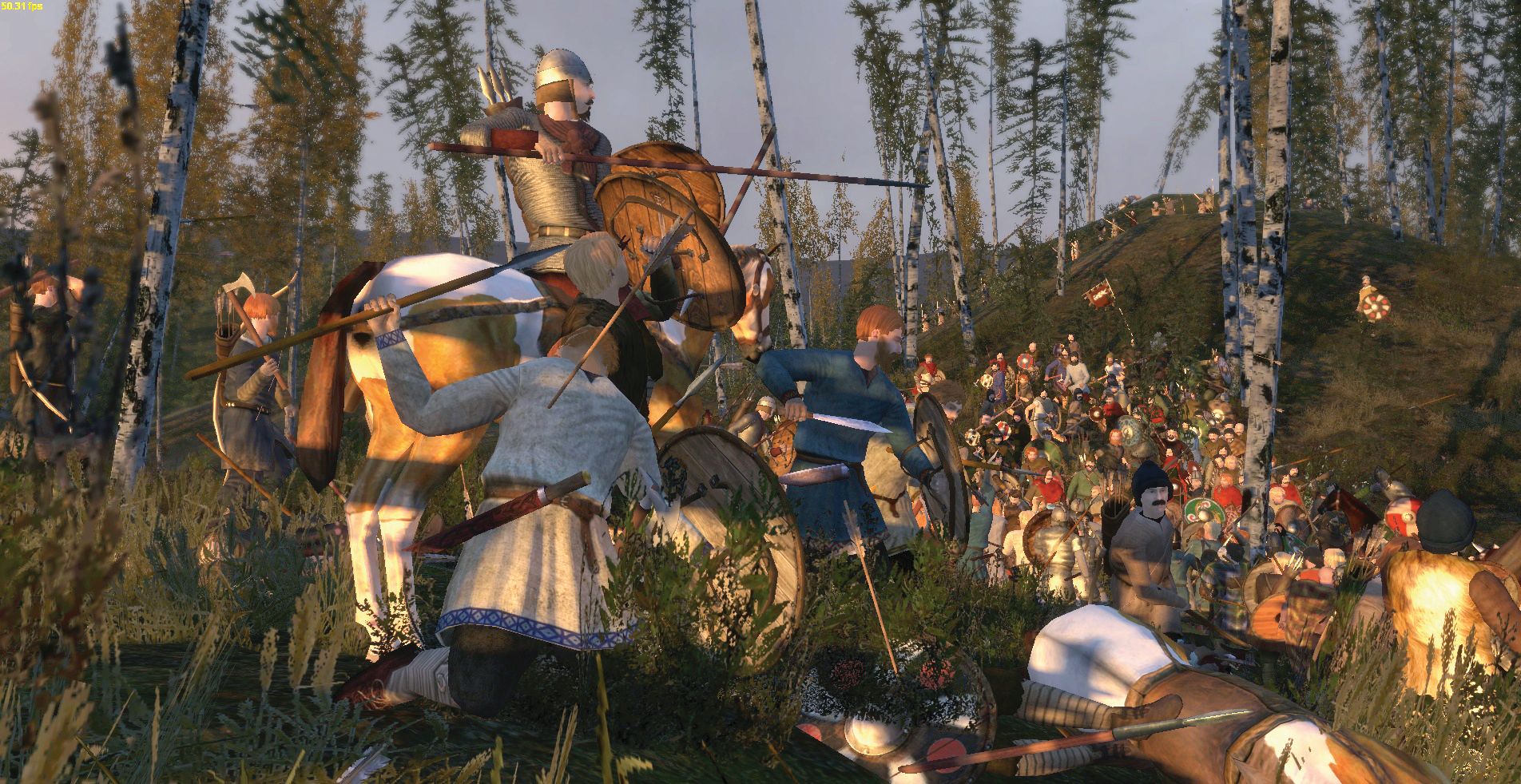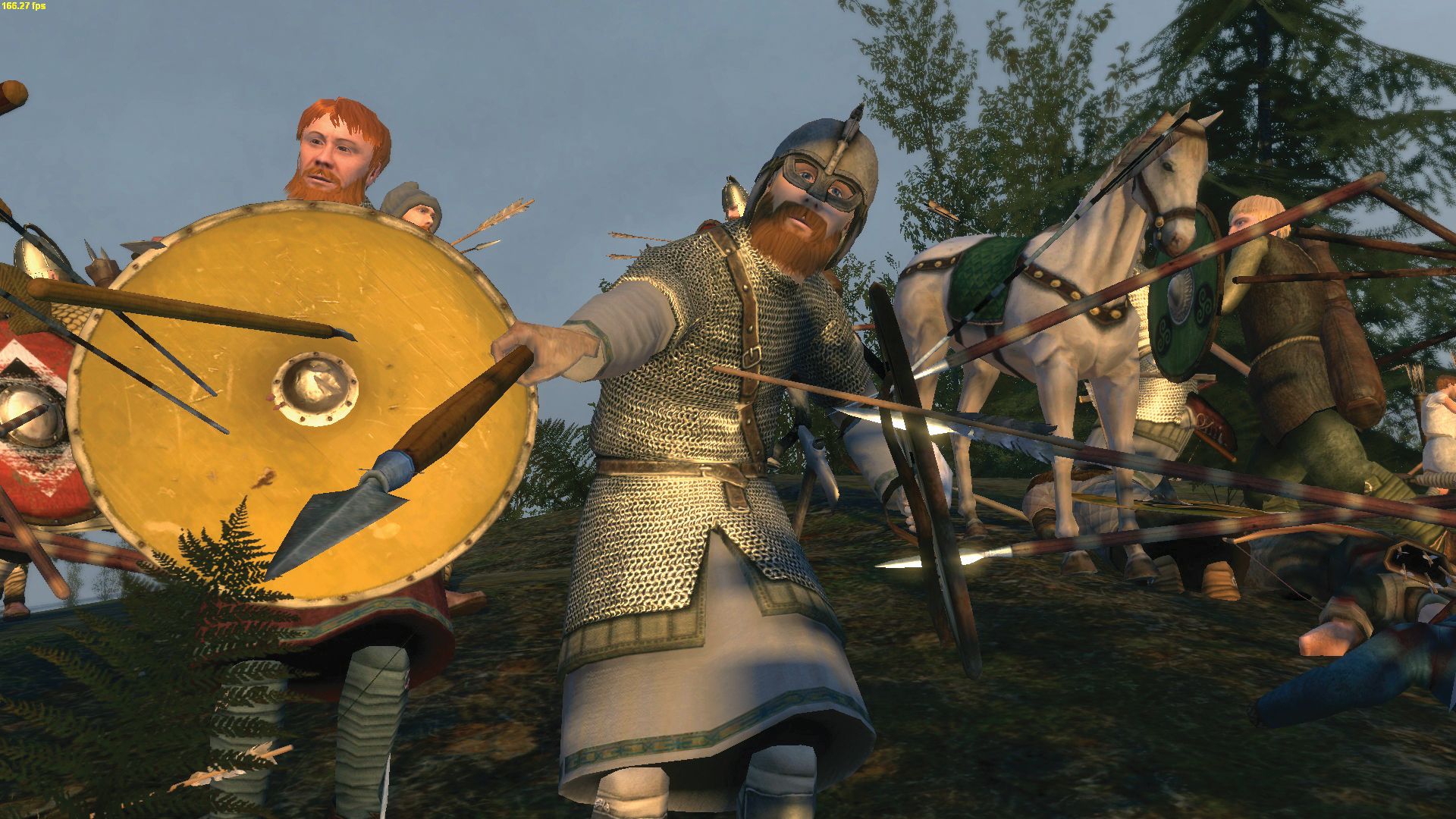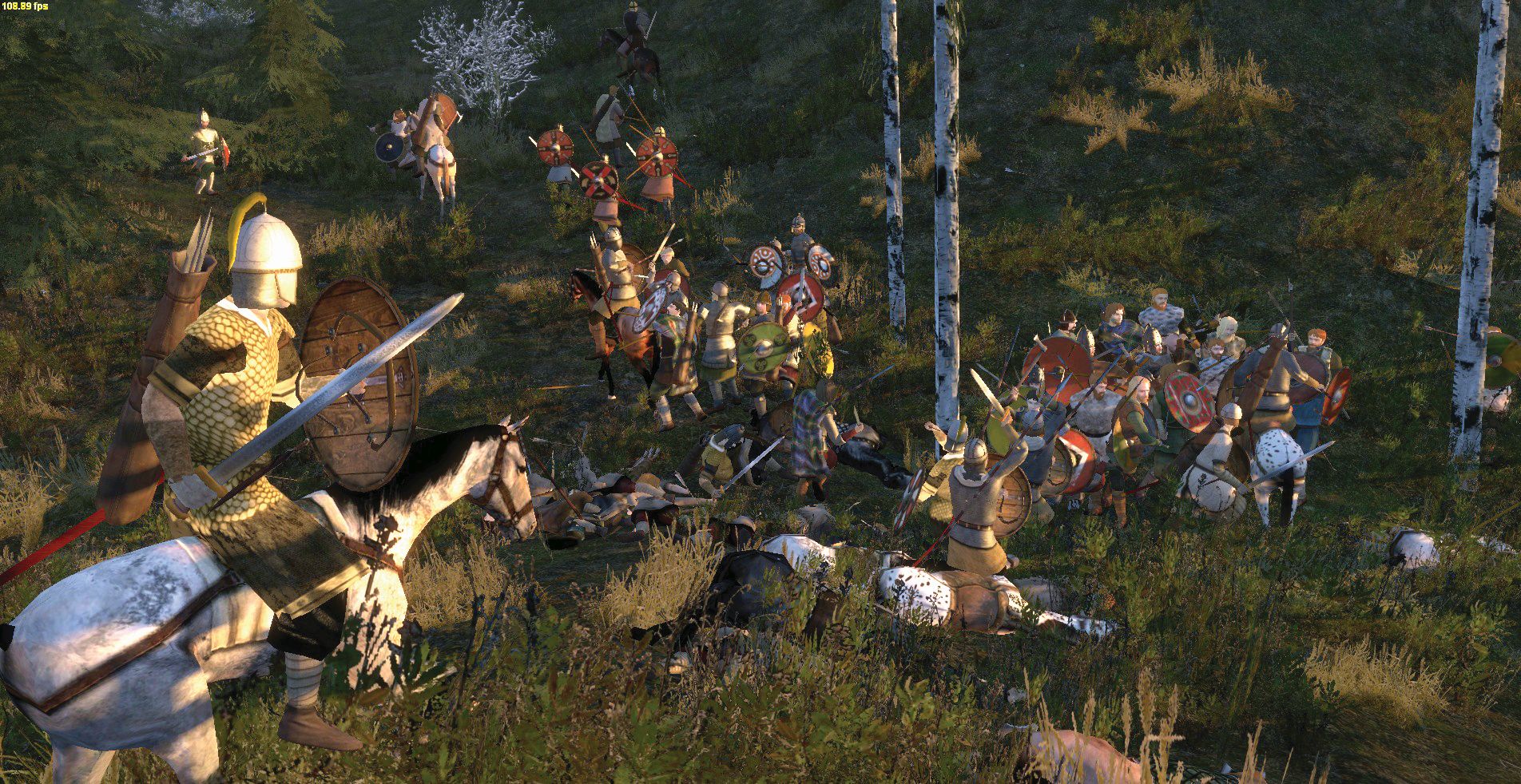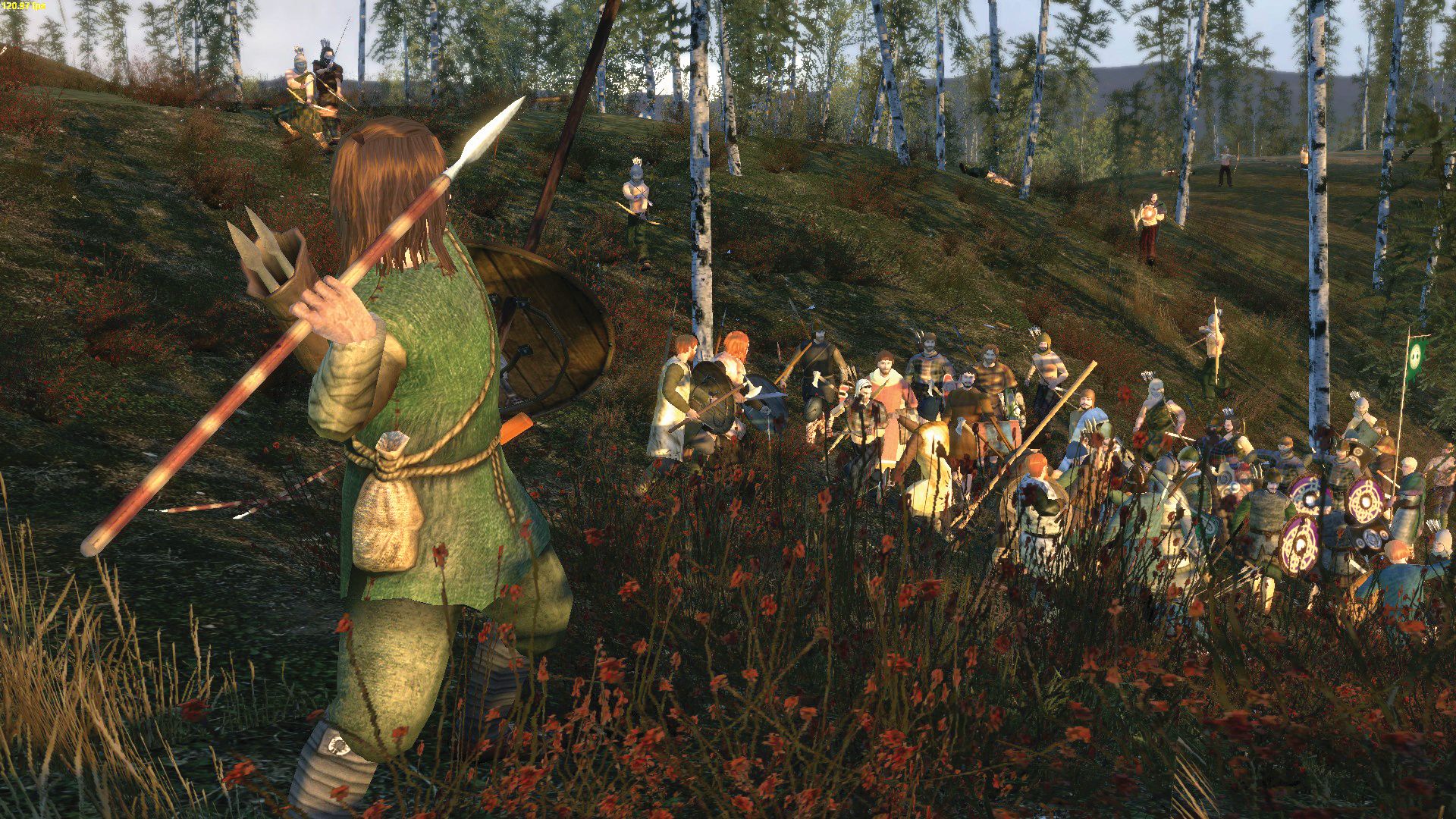How seven Mount and Blade modders formed a games studio
How hobbyists were hired to create an official Mount and Blade expansion.

Mount and Blade: Warband is a playground for mod lovers, with overhauls transporting players to Middle-earth, Westeros, or Star Wars’ galaxy far, far away. Arguably, though, its most significant mod isn’t set in some fantastical land, but in seventh century Britain. Brytenwalda is the passion project of Alberto ‘Ibidil’ Fuentevilla de Diego, a Spanish modder who transformed Britain’s Dark Ages into a mod, then DLC, and established an indie studio. When he began tinkering with game files in his spare time, he couldn’t have known how far his determination and passion would get him.
Ibidil is a creative type, always telling stories in whatever way he can, and he found recognition in the modding community for his work on Iberia: Total War, the 2005 total conversion mod to Rome: Total War. Ibidil became involved after a community of Spanish gamers felt its nation was portrayed with too many historical inaccuracies; Iberia: Total War was developed in part to address these issues. Ibidil dealt with documentation relating to the mod as well as editing the battle system and organising the work of those modding models and textures—giving him a well-rounded suite of experiences to bring forward.
Like Britain itself, Ibidil progressed from Rome to the Dark Ages. This change came from reading about the fall of the Roman Empire, and post-Roman Britain. “It was a world with very defined dynamics, of small and warlike kingdoms, with kings who knew that everything played out on the battlefield,” he says. It was perfect for a game. Not many records remain from the period, hence the name ‘Dark Ages’, but this only empowered Ibidil. He loved the rich and complex history of seventh century Britain and wanted to bring the period to life—he found it a shame “names like Penda or Cadwallon were only known by historians”. He even translated the Canu Heledd, a series of early Welsh poems, into his native Spanish.
At this time he was moving on to a new passion. Mount and Blade: Warband is popular among modders, with the freedom of the base game translating well to popular contexts. The game, with its medieval setting and focus on the exploits of the common man, chimed with Ibidil’s interest in medieval Britain. “It was as if TaleWorlds had read my mind,” he says. He saw an opportunity. “Videogames can make stories and history come alive.” Britain was ripe for the coding.

The freedom presented by Mount and Blade: Warband’s open world let Ibidil tell stories in a unique way. Playing games to Ibidil “means experiencing history in a different, more hands-on, way”. The obscurity of the Dark Ages made it the perfect setting for him to weave his own adventures. The mod was named after the old British term ‘Brytenwalda’, or ‘Britain-ruler’. As Mount and Blade: Warband is about claiming land for your kingdom, the name was apt.
Brytenwalda was never intended for other players, it was “a simple mod, just for myself”, says Ibidil. He wrote a quest here, changed textures there, and little by little the fictional kingdom of Calradia turned into Britannia. But Ibidil couldn’t hide his desire to tell stories. He released a rough beta of the mod, and Warband modders loved it. An opportunity arose—“I wanted everyone to enjoy the Dark Ages,” Ibidil says.
Ibidil was wise to the low completion rates of mods—the TaleWorlds online forum is peppered with blogs for mods that never left the nest. He knew that to succeed he couldn’t go it alone, so he tapped into Warband’s budding mod scene. Asbjørn Lindegaard ‘Adorno’ Møller from Denmark had been developing scenes and locations as a hobby, and decided to join forces with Ibidil before the mod’s first official version. As more versions were released, the team kept growing; Michael ‘Motomataru’ Richter from the US, Matthias ‘Phaiak’ Grohmann from Germany, and Marco Aurelio ‘Yeyo’ Balbás Polanco, Leyre ‘Elyllon’ Ramirez Erviti and César ‘Caesar’ Iñarrea Sangués from Spain were brought into the fold. Their expertise in modding, and history, made for a productive harmony.
Keep up to date with the most important stories and the best deals, as picked by the PC Gamer team.
Thankfully, the rest of the team came to see Britannia through Ibidil’s eyes. “I remember first reading Ibidil’s post about his pursuit to create a historical mod about Britain in the seventh century, and thought, ‘Who is this guy?’” Adorno says. “I certainly didn’t think such a relatively obscure time period would make for a popular mod.” But as the blank spaces in the seventh century drew in Ibidil, they also captivated the others. “Almost everyone knows about the Roman era in Britannia, the legendary King Arthur, and the Viking raids on the British Isles. But the seventh century! What happened there?” Adorno says. As the mod developed, the players were brought into the fold, too. “Your own passion for something can infect others,” Adorno adds.

There may have been seven modders but there were hundreds of contributors to Brytenwalda. The mod has been downloaded nearly 100,000 times on Nexus Mods alone and each player had suggestions for tweaks and changes. “It’s both helpful and motivating, but also challenging, since you need to keep focus. You can’t satisfy everyone,” Adorno says. With each version of the mod more novel features were added, like naval combat and a religious system. The latter is such an important system that Ibidil says he can’t imagine the mod or the resulting DLC, Viking Conquest, without it.
The mod grew from a historically set alternative to Warband, to a distinct game with novel features, options and challenges. For this, the team, needed more talent. “It’s also important to point out Brytenwalda had many contributors, a long list of other modders whose work was incorporated into Brytenwalda—sometimes at the request of users/fans,” Adorno says.
Fans weren’t the only people paying attention to Brytenwalda, however. Just as Brytenwalda was hitting peak popularity, Cem Çimenbiçer from TaleWorlds approached the mod team with a proposition—‘Why don’t you turn this into an official DLC?’ And so the Brytenwalda mod team turned into Brytenwalda Studios.
Immediately, the group’s dynamic changed. Previously it’d been a collection of fans, working in their spare time; now they were professionals contracted to perform and deliver regular work and status updates. They had to work to broader plans and deadlines. Compounding this shift was the decision to not just adapt the mod into DLC but use it as a basis to create an entirely new experience. “I did not want to repeat,” Ibidil says. Brytenwalda became Viking Conquest.

Thankfully, TaleWorlds was supportive, with Motomataru describing the studio as “informal, friendly, and trusting”, adding, “I was surprised by how much support they gave us with additional operators into the engine and modifications for the pathing, etc.” The team continued to collaborate from afar. Phaiak explains, “This method worked out well during the mod development and it felt natural for us to go on that way."
However when Viking Conquest launched, fans realised it wasn’t the expansion they were hoping for. “We overestimated what we would be able to reach,” Caesar explains. Even cutting features before release, the extra systems added on top of the base game took their toll. Fans and the press were quick to point out the bugs and stability issues the DLC’s expanded scope brought about, and its intense difficulty was enough to handicap even veteran Warband players. Caesar admits the step from free mod to paid expansion wasn’t handled as successfully as they’d hoped, with “performance issues that brought a lot of bad reviews, most of them due to the big step we made from the native game”.
Brytenwalda Studios knew that fans’ goodwill was at stake, and, as a team made of up fans themselves, they knew this period was make-or-break for the team.
“After all that process we certainly learned a lot about keeping our ambitions in the floor and not flying to the sun,” Caesar continues. “After that hard hit from the reviews, we focused more on the quality of features than the quantity.”
One of the greatest virtues of any creative person is to keep working on a project despite setbacks and criticism—a rocky launch doesn’t signify a broken game. Brytenwalda Studios knew that fans’ goodwill was at stake, and, as a team made of up fans themselves, they knew this period was make-or-break for the team. They worked tirelessly creating updates for Viking Conquest.
Seven months after Viking Conquest’s release the team finished the Reforged Edition, a patch that eradicated the bugs. It took hard work, and an honest confrontation of all that had hindered the devs during development of the DLC, including a discussion of their actual vision and scope for the game. Their effort paid off, and the reviews on Steam have nearly all been positive.
Brytenwalda began as a solo passion project but snowballed into a multinational team of devs with an official piece of content for a beloved game. Ibidil and his team showed that developers, modders and players inhabit not a strict hierarchy but a close-knit ecosystem, in which dedication, passion and perseverance leads to profound success. Today, the team is working on unannounced projects, with an aim to “produce new titles from our company values of immersion, complex stories, and historical fidelity”.

